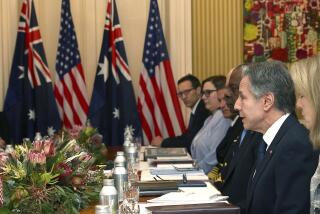Is a hero of democracy trying on a crown?
- Share via
WHILE the attention of U.S. leaders is concentrated on the war in Iraq, Nigeria may be headed for a grave political crisis, a development that could harm American interests.
Nigeria is the fifth-largest source of crude oil for the United States. It is pivotal to American hopes for the spread of democracy and stability in West Africa. Over the last 10 years, Nigeria has spent $15 billion to rebuild the collapsed states of Sierra Leone and Liberia. Nigeria also recently signed a security agreement with the United States, underscoring its importance as an ally in a region where Al Qaeda is reportedly seeking a foothold.
Loyalists of President Olusegun Obasanjo want to amend the Nigerian Constitution to allow him to remain in office after 2007, when his second term is scheduled to expire. Although he has publicly denied any intention to seek a constitutional change, Obasanjo has not urged his supporters to abandon their cause. Indeed, the loyalists have pressured Vice President Alhaji Atiku Abubakar, an Obasanjo rival, to leave the ruling People’s Democratic Party, which would facilitate a third term for Obasanjo. If this political struggle continues and intensifies, the fabric of Nigerian democracy could be strained, possibly making the country ungovernable.
Political crises in Nigeria are usually connected to the government’s control of the country’s huge oil wealth. In the past, military dictators have refused to leave office lest they lose this power.
In 1979, Obasanjo was the exception, becoming the first military head of state to transfer power to a democratically elected civilian in Nigeria. The peaceful transfer of power earned him a reputation as one of Africa’s preeminent statesmen.
But Obasanjo’s critics now liken him to President Yoweri Museveni of Uganda, who orchestrated the amendment of that country’s constitution to give him a third term. The move has bred cynicism and frustration among Ugandans.
Why would Obasanjo risk such an outcome? He has a sterling international reputation for democratic and honest leadership. He has put in place policies that will improve the domestic economy. He works tirelessly for regional peace. More than any previous Nigerian leader, he has combated corruption.
But he does not trust Abubakar, whom he has accused of disloyalty, to carry out his program. Bad feelings between the two leaders also extend to other potential contenders, whom the Nigerian president considers corrupt. Two anti-third-term movements sympathetic to Abubakar have sprouted and merged to form a political party.
Yet if Obasanjo succumbs to the African disease of self-perpetuation in office, the precarious balance of ethnic, regional and religious groups in Nigeria might come crashing down.
Obasanjo loyalists in the National Assembly are trying to round up the necessary two-thirds vote in each chamber to initiate the process of amending the constitution. The business of “persuasion” has already begun. Some legislators have been offered bribes of more than half a million dollars, according to Nigerian media reports. But the money may buy nothing more than a Pyrrhic victory. Confronted with a flagrant abuse of power, the Nigerian military might not sit idly by in its barracks.
Washington has been mute on the potential erosion of democratic trust in Nigeria. If it remains so, the U.S. will lose credibility among Africans for its call for more democracy and freedom in Africa. To avoid that, Washington and such respected leaders as former presidents Jimmy Carter and Bill Clinton, both friends of Obasanjo, should unequivocally disapprove of self-succession in Nigeria. That could have an immediate effect and would be far less expensive than a Nigeria in turmoil.
More to Read
Sign up for Essential California
The most important California stories and recommendations in your inbox every morning.
You may occasionally receive promotional content from the Los Angeles Times.










